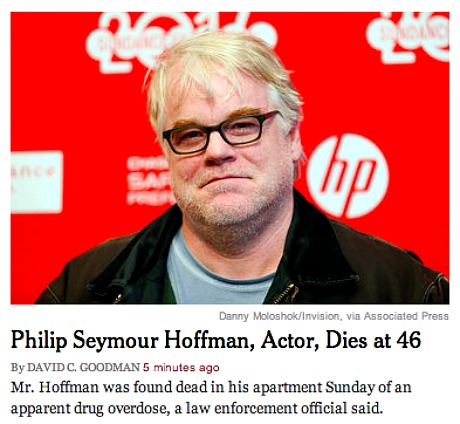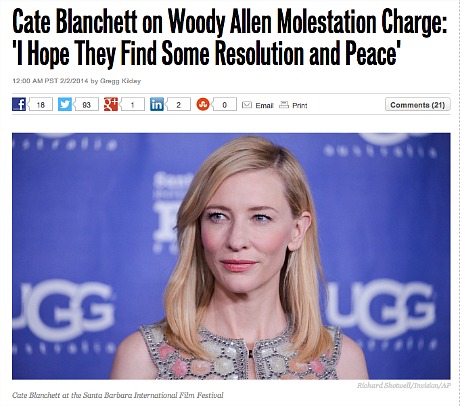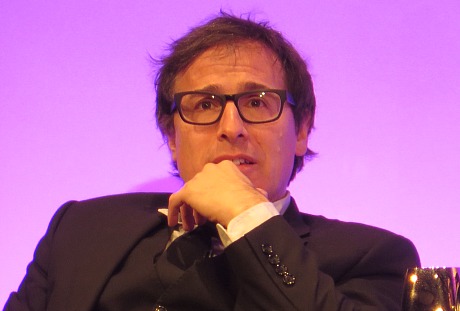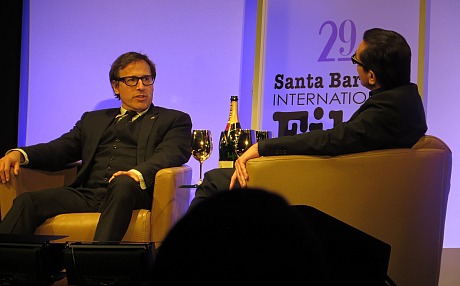Daily
Hoffman Reported Dead
The Wall Street Journal is reporting that Philip Seymour Hoffman has been found dead in his New York apartment. “The New York Police Department is investigating, and the Office of the Chief Medical Examiner to determine exact cause of death,” the brief story reports. “The official said Mr. Hoffman, 46 years old, was found dead at his apartment at 35 Bethune St. in the West Village neighborhood of Manhattan.”

A 5.31.13 L.A. Times story by Nardine Saad stated Hoffman “has left a detox center that he entered to get ahead of drug problems that are said to have been spinning out of control, according to reports. The Master actor revealed to TMZ that he’d [begun] using drugs again about a year ago, starting off with prescription pills then escalating to snorting heroin.
“[Hoffman] said the heroin use only lasted about a week, but he decided to check himself into a detox facility on the East Coast to take control of the problem.”
This is the saddest, most shocking, most cataclysmic loss since the death of Heath Ledger six years ago.
Sidenote: Hoffman’s death was reported fraudently yesterday. Some kind of stupid internet hoax (which it was at the time). Denied, laughed off, more internet b.s.
Blanchett At The After-Party
I was invited to attend the after-party following last night’s Cate Blanchett‘s tribute at the Santa Barbara Int’l Film Festival. Naturally I felt it was fair and necessary to ask her about Dylan Farrow’s letter, published yesterday afternoon by N.Y. Times columnist Nicholas Kristof, accusing Woody Allen of having molested her at age 7. There’s obviously no connection between a 20 year-old family trauma and a recent creative collaboration, but the director-writer of Blue Jasmine and obviously the one most responsible for Blanchett’s Best Actress accolades (including a very real chance that she might win the Best Actress Oscar) was and is under intense fire. With The Hollywood Reporter‘s Scott Feinberg and Awards Daily‘s Sasha Stone suggesting that Farrow’s letter could (however idiotically) work against Blanchett’s Oscar chances, I asked if she had a reaction. I tweeted her response a few minutes later. The Hollywood Reporter‘s Gregg Kilday ran a piece about her quote around midnight.



Dylan Speaks Out
28 year-old Dylan Farrow has written a letter to N.Y. Times columnist Nicholas Kristof about what she claims was a sexual assault by Woody Allen in 1992, when she was seven. Kristof has written a column that includes portions of her letter and which offers comments and questions.
No one can be clear about what may have actually happened, but I’m not going there again. Dylan has “come out” because of a special Golden Globe career-tribute award recently given to Allen in absentia. She obviously wants the world to know that Allen is not a right guy. She told Kristof that “when she heard of the Golden Globe award being given to Allen she curled up in a ball on her bed, crying hysterically.” It therefore seems a reasonable assumption that if the Hollywood Foreign Press Association had not given this award to Allen, Dylan would not have broken her silence…right?
Kristof’s access to Dylan was arranged through Mia and Ronan Farrow, with whom he’s friendly. In other words, whatever the final truth of the matter, feelings of rage and vengeance on the part of Mia and Ronan Farrow are why this incident is being re-aired. Dylan may have been violated by Allen 21 years ago, maybe, but the Kristof piece is meant to to cause damage or, if you will, deliver some payback. In the absence of incontrovertible proof, it’s basically a grenade thrown over the wall.
Russell Does Figure-Eights Around Durling
Legendary steam-of-consciousness surfer and genius director David O. Russell, who is currently Oscar-nominated for American Hustle, was tributed last night at the Santa Barbara Film Festival. Festival director Roger Durling tried to conduct a normal “interview” but Russell wasn’t going for it. In fact he advised the befuddled Durling to loosen up and just let it happen. Interviewers need to understand this. DOR doesn’t answer questions. Well, he does but if I’ve heard him say “I forgot the question” once I’ve heard it 15 or 20 times. All an interviewer needs to do is drop a thought or a memory byte or some fleeting observation into the vast lake of free-associating consciousness and tap-dancing, lightning-reflex improv that is Russell’s grab-bag mind and just….let him rip!

David O. Russell during last night’s tribute interview at Santa Barbara’s Arlington theatre.

Russell and SBIFF festival director Roger Durling.
And yet if you go on too long (as I feel Durling did last night — the interview lasted two hours or about 30 minutes more than ideal) Russell’s incandescence can burn out. SBIFF interviews are a dance but Russell’s rap is a world-class “act” and it all ended well. And yet there’s a lesson to be learned: Always leave them hungry for more.
Is Russell going to win Best Director for Hustle, having been denied a win for Silver Linings PLaybook and The Fighter? The betting seems to favor Gravity‘s Alfonso Cuaron but who knows? I love Russell. I could listen to his always perceptive but scattershot observations and recollections every day. It doesn’t matter if I don’t feel quite as enthusiastic about Hustle as I did about his previous two films. I’m in for the long haul, and so is DOR. Right now is the best time of his life (and mine). Russell is on a roll, nothing can stop him but eventually something will. It’s inevitable. But Russell has the spirit to keep punching and pitching so he’ll bounce back when that happens — no concerns on that score.
Under Siege
A smug, semi-beguiling asshole radio personality (Steve Coogan) makes ratings hay out of a hostage/standoff situation after a sacked employee (Colm Meaney) loses it. I’m sensing something moderately clever and subversive as far as it goes. Alan Partridge (formerly titled Alan Partridge: Alpha Papa) earned an 84% Rotten Tomatoes score after it opened theatrically in England last summer and in Australia in the fall. A VOD debut will happen on 2.27 with a U.S. theatrical opening set for 4.4.
Respecting Mr. Schell
Maximilian Schell, the much-honored actor-director with the cultivated European air, died last night in Innsbruck at age 83. My dominant memory will always be his electrifying performance as Hans Rolfe, the clever German attorney who defended Burt Lancaster‘s Ernst Janning in Judgment at Nuremberg (’61), for which he won a Best Actor Oscar. Schell/Rolfe was a blend of crackling intelligence, necessary poise, a burning determination to be heard and a nativist resentment of American occupiers. He didn’t just hold up his end in that Stanley Kramer film — he was a virtuoso, a young actor riding a perfect storm of talent, timing and a first-rate script.
Schell’s other noteworthy performances: the larcenous, tuxedo-wearing mastermind thief in Jules Dassin‘s Topkapi (’65), a hyper and obsessive German officer in The Young Lions (’58), a Holocaust survivor with a hidden idetntity in The Man in The Glass Booth (’75), an anti-Nazi activist in Fred Zinneman‘s Julia (for which he was Oscar nominated and was given the New York Film Critics Circle award for Best Supporting Actor) in 1977, and Tea Leoni‘s estranged father in Deep Impact (’98).
Starting in the late ’60s Schell began to direct, write and costar in several German-produced films of his own devising, almost none of which I saw or even paid attention to. But the Oscar-nominated Marlene (’84), his documentary about Marlene Dietrich, was a major standout. Schell was forced to creatively adapt to a tough situation when Dietrich changed her mind about appearing in present-tense interview footage. But he managed it well and won a NYFCC award for Best Documentary.
The Austrian-born Schell was quite the handsome continental smoothie during the ’60s, ’70s and ’80s. But at some point during the ’90s his eyes changed, his voice became deeper and more guttural, and he grew a beard. In one of the oddest transformations in motion picture history (particularly for a good-looking guy who began as a German-styled Montgomery Clift by way of Cary Grant), Schell more or less became a variation of Akim Tamiroff. This, at least, is how he seemed to me in Little Odessa (’94) and particularly in Deep Impact. That 1998 disaster fick was mostly ludicrous, but the “oh, Daddy” scene on the beach between Schell and Leoni was moderately affecting.
Grimming Up For Silence
I’ve never been that excited about Martin Scorsese‘s intention to direct an adaptation of Shusako Endo‘s “Silence,” which is set in 16th Century Japan. I’m afraid it will be a kind of Christian Kundun. I’ve always had a basic aversion to all things Christian (at least since my early 20s) and I nod out every time I see a movie about historical Japan. Is Silence going to be a solemn downer with torture scenes? A melancholy tale of martyrdom? I only know that my insect antennae are picking up signals along these lines.”
That aside, today’s announcement that Liam Neeson will star in the film is the best thing to happen to his career since he became an senior action star in ’08 with Taken. It will be Neeson’s first top-tier dramatic role (it’s presumed he’ll play a fallen Jesuit priest named Ferreira) since Kingdom of Heaven. Andrew Garfield, Ken Watanabe and Adam Driver will costar.
Ape With Hots for Elisabeth Shue
Nobody remembers Richard Franklin‘s Link (’87), but it was a witty, better-than-decent genre thriller. Nicely acted by Terrence Stamp and Elizabeth Shue, fairly well written by Everett De Roche, very carefully composed. Franklin (who died in ’07) shot it with a kind of Hitchcockian discipline. I wrote the press notes and in so doing interviewed Franklin, and he worked very hard, he told me, to put Link together just so. It was filmed in Scotland but it’s certainly not a “horror film,” as the Wiki page states. It’s a tongue-in-cheek thing, clever and dry. “Link” is a chimpanzee in the film but he was played by an orangutan with a dyed coat. I helped out with Link screenings at Cannon headquarters on San Vicente Blvd., and I remember playing The Kinks “Ape Man” (a portion of which is heard in the film) as a kind of overture for invited guests. Consider Walter Goodman‘s N.Y. Times review.
Need To See A Film Or Take A Walk
There’s something almost thrilling about entering a clean and tidy hotel room for the first time. You feel refreshed, renewed — almost like starting your life over. And then you unpack and turn on the computers and the TV. You start personalizing the place in various ways. And within an hour or two the room has become almost exactly like your home. Nothing special or exotic — the toys and ornaments of your life have simply been transferred to another location. The thrill is gone. Your not-entirely-fastidious living habits are the same. Not that there’s anything wrong with that. Your life is your life.
Genuinely Sorry About This
I’ve never related to Gov. Chris Christie‘s blustery pugnacious manner, but on some perverse level I don’t mind it. I’m a New Jersey guy from way back so I get that kind of personality. At least Christie isn’t a blow-dried phony — he is what he is. And he’s a kind of moderate Republican, at least compared to the Tea Party wackos. (Okay, maybe he isn’t.) I was really looking forward to a highly combustible presidential primary battle between Christie and Rand Paul, and particularly a contest between Christie and Hillary Clinton for the White House itself. I guess that’s not going to happen now.

Ian in Wonderland
This Bud Light commercial is about the preponderance of empty external stimuli in the 21st Century, and how all of it culminates in a paralyzing state of ennui and nothingness that would reduce Immanuel Kant (if he could be brought back to earth and put into this situation) to tears and pleading. And I’m not making this association because a place where I’m staying in Berlin next week is located on Kantstrasse. Ian is a gleeful, highly impressionable dolt. If it had been me I would have taken one look at that wine-colored stretch limo and that DJ in the back and stopped smiling immediately.
